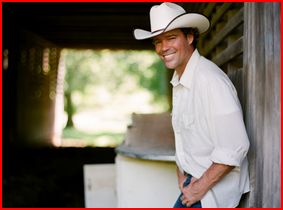

It's hard to imagine a hotter start to a country radio career than the one Clay Walker enjoyed in 1993 and 1994.
Walker's first single, “What's It To You,” went to No. 1 on the Billboard country singles chart in the summer of 1993. So did his second, the self-written “Live Until I Die.” By early 1995, Clay had racked up a whopping five No. 1 singles on now-defunct Giant Records Nashville.
It got much tougher from there. In the 15 years since “Live Until I Die” became Walker's fifth chart-topper, he's scored just one more No. 1, 1997's fine “Rumor Has It.”
But recent years have seen a powerhouse return for Walker, who's now recording for Asylum/Curb. He has also found a dream producer for Clay's style of soulful, Texas country – the fellow Lone Star State native Keith Stegall, who's produced Alan Jackson for years and in recent years has guided a breakthrough superstar in the Zac Brown Band.
“Keith is one of those guys that makes music which seems timeless but sounds current,” Walker says in a phone conversation from a tour stop in Aberdeen, South Dakota in mid-August. “I don't know what the secret of that is, that's why I hired Keith. One thing I can tell you is that there were never any moments of friction working with Keith and with John Kelton, who mixes Keith's records.”
After Walker's initial streak of No. 1 singles, he stayed near the top thru the 1990s with hits like “Hypnotize The Moon” (No. 2, 1996), “Then What?” (No. 2, 1998), and “The Chain Of Love” (No. 3, 2000).
But he knows now that perhaps it seemed easier than it should have back then.
“When an artist is new and they're hot,” Walker says, “it's very easy to have hits. And the mistake a lot of labels make, and I made it as well, is that the industry and the artists starts to realize that this person can sing 'Happy Birthday' and it's gonna get played on the air.”
That was then and this is now, and Clay knows that just about everything the drastically streamlined industry has changed in the last 15 years.
“Today, radio is much more picky and they judge an artist on a single-by-single basis,” Walker says. “I do hear artists put out songs that are weaker than they should be. Maybe they are touring or maybe the label chose the song for them, but I warn artists, especially those who are hot and new: Do not take it for granted. I did, and I paid the price for it.”

Walker moved to RCA for a few years and still had Top 10 success, but also delivered some singles that tanked. His first album with Curb with Stegall producing yielded a wonderful comeback single, the Top 5 “Fall” in 2007, and his current project features the exciting new single “Where Do I Go From You,” which is already creating a lot of buzz at radio.
One of the joys for Walker has been working with Stegall and with Doug Johnson at Curb – his former boss at Giant Records Nashville – in the A&R process for his new albums and singles.
“I've been doing this a good long while, and I've never once seen the caliber of songs that I have on this record,” Walker says. “I was so blown away by the songs Curb played me. I walked into an A&R meeting, one of the last ones before I went in to record. They played me four songs, and I recorded all four songs. All four were smashes.”
He's never been shy with his fans, and never afraid to face facts. In 1996, even while he was having hit after hit, he told the fans that he had been diagnosed with Multiple Sclerosis.
Clay's colleagues often marvel at his gifts. “Mark Chesnutt recently gave me the biggest compliment I've ever been given by another singer,” Walker says. “Mark said, `when you sing a note, you grab hold of it, and you squeeze every possible ounce of blood you can squeeze out of that note. I don't know anybody who does that better.' Mark identified what my strength was, because I know that every note I sing is the last time I'll ever get to sing it.”
For more than 15 years, the notes Clay Walker have sung have delighted country fans and country radio. Now, the pairing of Clay Walker and Keith Stegall will keep his music front and center for years to come.
By Phil Sweetland
